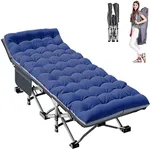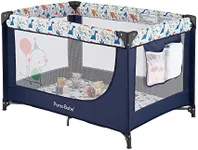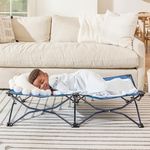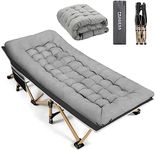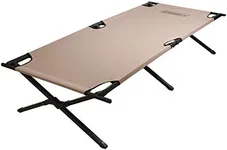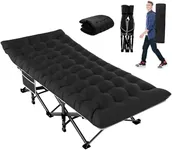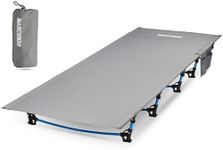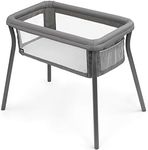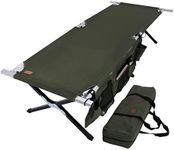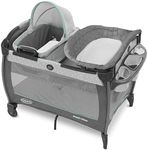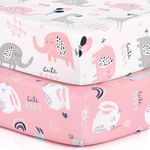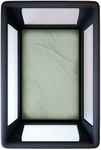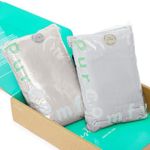Buying Guide for the Best Lightweight Cot
Choosing the right lightweight cot can make a significant difference in your comfort and convenience, especially if you travel frequently or enjoy outdoor activities like camping. A lightweight cot should be easy to carry, set up, and provide a comfortable sleeping surface. Here are some key specifications to consider when selecting the best lightweight cot for your needs.WeightThe weight of the cot is crucial because it determines how easy it is to carry and transport. Lightweight cots typically range from 2 to 10 pounds. If you plan to carry the cot over long distances, such as during hiking or backpacking trips, opt for a cot on the lighter end of the spectrum. For car camping or home use, a slightly heavier cot may be acceptable as it often provides more stability and comfort.
Weight CapacityWeight capacity refers to the maximum weight the cot can support. This is important to ensure the cot can safely hold the user without collapsing. Lightweight cots usually support between 200 to 300 pounds. Choose a cot with a weight capacity that comfortably exceeds your body weight to ensure durability and safety.
DimensionsThe dimensions of the cot, including length, width, and height, affect how comfortable you will be while sleeping. Standard cots are around 75 inches long and 25 inches wide, but there are variations. Taller individuals should look for longer cots, while those who move around a lot in their sleep might prefer wider cots. The height from the ground can also be important for ease of getting in and out of the cot.
Frame MaterialThe frame material impacts the cot's durability and weight. Common materials include aluminum and steel. Aluminum frames are lighter and resistant to rust, making them ideal for backpacking and camping. Steel frames are heavier but offer more strength and stability, suitable for car camping or home use. Choose the material based on your need for portability versus durability.
Fabric MaterialThe fabric material of the cot affects comfort and durability. Common materials include polyester and nylon. Polyester is durable, resistant to stretching and shrinking, and dries quickly. Nylon is lightweight, strong, and resistant to abrasion. Consider the fabric's breathability and ease of cleaning, especially if you plan to use the cot in various weather conditions.
Ease of SetupEase of setup is important for convenience, especially if you need to set up the cot frequently or in low-light conditions. Look for cots with simple, intuitive designs that can be assembled quickly without tools. Some cots feature a folding mechanism, while others may require attaching legs or supports. Choose a cot that matches your comfort level with assembly and the frequency of use.
PortabilityPortability encompasses the cot's weight, packed size, and whether it comes with a carrying case. A highly portable cot is compact when packed and easy to carry, making it ideal for travel and outdoor activities. Check the packed dimensions to ensure it fits in your backpack or vehicle. A carrying case with handles or straps can enhance portability.
Comfort FeaturesComfort features such as padding, built-in pillows, or adjustable tension can enhance your sleeping experience. Some cots come with extra padding or a built-in mattress for added comfort. Adjustable tension allows you to customize the firmness of the sleeping surface. Consider these features based on your personal comfort preferences and the conditions in which you'll be using the cot.
